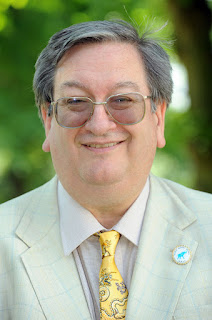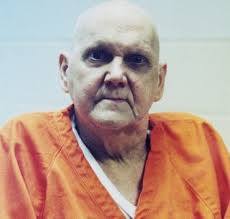Grandmaster Raymond Keene, OBE
Raymond Dennis Keene was born on January 29, 1948 in Wandsworth, London. His parents were Dennis Arthur Keene and Doris Anita Leat.
In 1954, at the age of 6, he learned how to play chess from his mother.
Between 1959 and 1966, he attended Dulwich College and played top board for the school team. His team won the Sunday Times National Schools’ Chess Tournament in 1965 and 1966.
In 1960, he started playing organized chess in British chess clubs,
In January 1964, he won the London Under-18 Championship.
In August 1964, he won British Under-18 Championships (shared by Brian Denman.
In 1965, he won the Surrey Chess Championship.
In August 1965, he represented England at the World Junior Championships, held in Barcelona.
In August 1966, he represented England at the Students’ Olympiad in Orebro, Sweden.
In October 1966, he represented England at the 17th Chess Olympiad in Havana. He was 2nd reserve board with 4 wins, 5 draws, and 1 loss. Keene was able to get Fidel Castro’s autograph (twice) on Castro’s autobiography, written in Spanish, that Keene carried around with him while in Havana.
In 1966, he won the Hastings Challengers tournament.
In 1966-67, he was the Southern Counties (SCCU) chess champion.
In 1967, he attended Trinity College, Cambridge. He studied modern languages (French and German), specializing in German and the literature of Johann Wolfgang von Goethe (19 volumes) and works of Friedrich Schiller, and graduated with honors with a Master of Arts degree. Keene studied Goethe as his special paper at Trinity College. He was asked to stay on for a PhD, but declined to play chess and become a grandmaster. Keene played top board for the university.
In his last year at Cambridge, he shared lodgings with Prince Charles for his final year. Keene said he was very quiet, but Keene did steal a sausage roll from the Prince.
In July 1967, he represented England at the World Junior Championships, held in Jerusalem. He took 2nd place, behind Julio Kaplan (1950- ).
In August 1968, he took 2nd in the British Chess Championship at Bristol, England.
In 1968, he represented England at the 18th Chess Olympiad in Lugano, Switzerland. He played Board 4 with 9 wins, 8 draws, and no losses. He won the prize for the best score on Board 4.
In 1970, he represented England at the 19th Chess Olympiad in Siegen, West Germany. He played Board 2 with 6 wins, 10 draws, and no losses.
In 1971, he won the British Chess Championship at Blackpool, England.
In 1972, he was awarded the International Master (IM) title. He was the first English player to achieve this since Jonathan Penrose (1933- ) in 1961.
In 1972, he represented England at the 20th Chess Olympiad in Skopje, Yugoslavia (now Macedonia). He played Board 1 with 5 wins, 12 draws, and 2 losses.
In 1973, he scored 100 wins, 5 draws, and 1 loss in 4.5 hours at a simultaneous exhibition at Oxford. He was afterwards able to recall the moves of all 107 games perfectly, from memory, with no mistakes.
In 1973, he represented England at the European Team Championships at Bath, England.
In 1973, he won an international tournament at Woolacombe.
In 1974, he came 6th at Hastings.
In 1974, he took 1st at the Capablanca Memorial Masters in Cuba.
In July 1974, he married Annette Sara Goodman, the sister of IM David S. Goodman (1958- ). She is an ex-ballerina and now a dance teacher.
In 1974, he represented England at the 21st Chess Olympiad in Nice, France. He played Board 2 and scored 7 wins, 6 draws, and 2 losses.
In 1975, he took 3rd at the German Open tournament at Mannheim.
In 1975, he took 2nd at Alicante.
In 1976, he was 2nd at the Aarhus tournament in Denmark.
In 1976, he was awarded the International Grandmaster (GM) title by FIDE. Keene became the second over-the-board grandmaster, after Tony Miles (1955-2001).
In 1976, he represented England at the 22nd Chess Olympiad in Haifa, Israel. He played Board 2 and scored 4 wins, 6 draws, and no losses.
In March 1977, he became a chess columnist of The Spectator newspaper.
From 1978 to 1982, he was the editor of Modern Chess Theory, a magazine on chess openings.
In 1978, he represented England at the 23rd Chess Olympiad in Buenos Aires. He played Board 3, scoring 2 draws and 2 losses.
In 1980, he won a category 8 tournament at Dortmund.
In 1980, he represented England at the 24th Chess Olympiad in La Valletta on the island of Malta. He played 1st reserve and lost 2 games.
In 1981, he was the first western chess grandmaster to compete in China.
In 1984, he organized the USSR vs. Rest of the World (ROW) match in London.
In 1985, he was the chess correspondent of The Times, a British daily newspaper.
In 1985, he became the 6th British chess player to be awarded the Officer of the British Empire (OBE) when it was awarded in the Queen’s Birthday Honours List. Queen Elizabeth awarded the OBE to Keene in person for his services to the United Kingdom and beyond.
In 1991, Keene met Tony Buzan (1942-2019), the inventor of Mind Mapping. Together, they wrote The Book of Genius, The Book of Mental World Records, and many more. Keene organized the first World Memory Championship, held in London in 1991. Keene became the Global President of the World Memory, Mind Mapping and Speed Reading Sports Councils. He has organized 28 World Memory championships since 1991.
In 1991, his son, Alexander Phillip Simon Keene, was born. Alexander’s godfather is IM David Levy.
In August 1992, he organized the first ever Human vs. Computer world championship in any thinking sport. He organized the match of Dr. Marion Tinsley (1927-1995) vs. Chinook computer World Draughts (checkers) championship, held at the Park Lane Hotel in London. Tinsley defeated the computer program with 4 wins, 2 losses, and 33 draws.
In 1997, he organized a multi Mind Games competition as London’s Royal Festival Hall
In August 2017, he ended his chess column in the Sunday Times.
In September 2019, he ended his chess column in The Spectator newspaper.
In November 2019, he ended his chess column in The Times.
Keene has written 205 books as of 2021. His books have been translated into 14 different languages.
Louis De Veauce – Raymond Keene, Bognor Regis blitz 19631.f4 e5 2.fxe5 d6 3.exd6 Bf5 4.dxc7 Qxc7 5.Nc3 Bd6 6.Nb5?? [6.e4] 6…Bg3+ 7.hxg3 Qxg3#
Bibliography
Flank Openings (1967, 1970, 1979, 1988)
Yugoslav Attack (1969)
The Hyper-Accelerated Fianchetto (1970)
The Modern Defence (1972) with Botterill
The King’s Indian Defence (1973) with Barden & Hartston
The Pirc Defence (1973) with Botterill
Aron Numzowitsch: Master of Palnning (1974, 1999)
How to Play the Opening in Chess (1974)
Karpov-Korchnoi 1974 (1974)
Howard Staunton (1975) with Coles
Learn From the Grandmasters (1975)
The 1974 World Chess Olympiad (1975) with Levy
The Chess Player’s Bedside Book (1975)
An Opening Repertoire for the Attacking Player (1977) with Levy
Becoming a Grandmaster (1977)
Haifa Chess Olympiad 1976 (1977) with levy
The Chess Combination from Philidor to Karpov (1977)
Modern Vedelem (1977)
Korchnoi vs. Spassky: Chess Crises (1978)
The World Chess Championship: Korchnoi vs. karpov: the Inside
Story of the Match (1978)
46th USSR Chess Championship, 1978 (1979) with Nunn
& Wade
The Openings in Modern Theory and
Practice (1979)
French Defense: Tarrasch
Variation (1980)
Understanding the Caro-Kann
Defence (1980)
Karpov-Korchnoi:
Massacre at Merano (1981)
The
English Explosion: From Miles to Short (1981) with Chandler
Batsford
Chess Openings (1982) with Kasparov
How to Play the Nimzoindian
(1982)
Keene’s Good Move Guide (1982)
An Opening Repertoire for White
(1984)
Maneuvers in Moscow:
Karpov-Kasparov II (1985)
The Evolution of Chess Opening
Theory (1985)
The Moscow Challenge:
Karpov-Kasparov (1985)
Maneuvers in Moscow:
Karpov-Kasparov II (1985)
The Brussels OHRA Tournament, 196
(1986)
Chess Openings as White (1986)
Grandmaster Nimzovich (1986)
Nimzowitsch-Larsen Attack – 1.b3
(1986)
The Centenary Match:
Kasparov-Karpov III (1986)
Showdown in Seville: Kasparov-Karpov
IV (1987)
The English Defence (1987)
Attacking Chess Openings (1988)
with Levy
Leonid Stein: Master of Attack
(1988)
The Simon & Schuster Pocket
Book of Chess (1988)
Batsford Chess Openings 2 (1989)
with Kasparov
How to Play the Caro-Kann (1989)
Warriors of the Mind (1989) with
Divinsky
Chess: An Illustrated History
(1990)
How to Beat Gary Kasparov (1990)
Battle of Hastings (1991)
Duels of the Mind: The Twelve
Best Games of Chess (1991)
How to Beat Your Chess Computer
(1991) with Levy
The Times Winning Moves (1991)
Winning Moves (1991)
Winning with the Nimzo-Indian (1991)
Battle of the Titans:
Kasparov-Karpov, New York-Lyons (1991)
Discover Your Chess Strength
(1992)
Fischer-Spassky II, The Return of
a Legend (1992)
The Complete King's Indian (1992)
Discover Your Chess Strength
(1992)
How to Play the Nimzo-Indian
Defense (1993)
Kasparov v. Short: The First
Challenge (1993)
Gary Kasparov's Best Games (1993)
Nigel Short: World Chess
Challenger (1993)
Nigel Short’s Best Games (1993)
The Age Heresy: How to Achieve
More – Not Less – As You Get Older (1994)
Contenders for the Crown (1994)
Winning With the Hypermodern
(1994) with Schiller
An Opening Repertoirefor White
(1995)
Winning Chess (1995)
A Complete Defense for Black
(1996) with Jacobs
The Age Heresy: How to Achieve
More - Not Less - As You Get Older (1996)
Winning Moves 2 (1996)
Samurai Chess: Mastering
Strategic Thinking Through the Martial Art of the Mind (1997)
Buzan's Book of Mental World
Records (1997) with Tony Buzan
World Champion Combinations
(1998)
Aron Nimzowitsch: Master of
Planning (1999)
Nimzovich: A Reappraisal (1999)
Keene on Chess (1999)
The Brain Games World Chess
Championship (2000)
The Evolution of Chess Opening
Theory (2001)
The Brain Games World Chess
Championship (2001)
Nimzowitsch – Formadalbe
Innovator (2001)
Warriors of the Mind (2001)
Brains in Bahrain (2002)
Discover Your Chess Strength
(2002)
Nigel Short: Best Games of a
World Title Challenger (2002)
Leonid Stein - Master of Attack
(2002)
How to Win with Hypermodern Chess
Strategy (2003) with Schiller
Killer Chess Tactics (2003) with
Schiller & Shamkovich
The Times Winning Moves (2003)
with Jacobs
Two Brains (2003)
A collection of columns from the
London Times Book of Chess: An Anthology 2001-2004 (2004)
Staunton's City: Chess in London,
Simpson's and The Savoy (2004)
Karpov-Korchnoi 1978 (2004)
Understanding the Caro-Kann
(2004)
World Chess Championship: Kramnik
vs. Leko 2004 (2004)
Chess Terminators: The Rise of the Machines
from Deep Blue to Hydra (2005)
Tony Miles - England's Chess Gladiator
(2006)
The Age Heresy (2012)
Little Book of Chess Secrets (2013)
Petrosian vs. the Elite: 71
Victories by the Master of Manoeuvre, 1946-1983 (2014)
Tony Buzan: Mapping the Man
Behind Mind Mapping (2017)
Carlsen v. Caruana, London 2018
(2018) with Jacobs
2020 Vision: Mind Sports, Mind
Mapping and the Brain (2020)
Fifty Shades of Ray: Chess in the
Year of the Coronavirus (2021)




Comments
Post a Comment